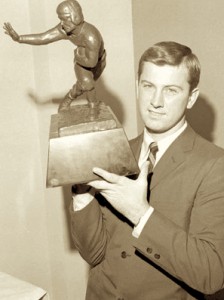Heisman Trophy is No Guarantee For NFL Success 10

After winning the Heisman Trophy in 1966, Steve Spurrier spent a decade in the NFL primarily as a backup quarterback.
There are five talented college players being considered for the prestigious Heisman Trophy this week. However, if any of them truly want to have a long and successful NFL career they might want to hope that someone else’s name gets called on Saturday night.
Since the Heisman Trophy was first awarded in 1935, it has gained a somewhat notorious reputation for being a harbinger of NFL futility, rather than NFL success.
Of the 73 men who have won the award, only eight have gone on to earn induction into the Pro Football Hall of Fame.
In fact, the number of Heisman winners who could be branded as NFL “busts” is significantly greater than the number who went on to be immortalized with a “bust” in Canton.
There are many reasons for this intriguing circumstance.
In the early years of the award, the NFL was still growing and salaries were sometimes less than players could earn in other careers.
The first Heisman winner, Jay Berwanger from the University of Chicago, was the first pick in the first-ever NFL Draft by the Philadelphia Eagles. However, Berwanger chose not to pursue an NFL career and never suited up as a professional. Read the rest of this entry →